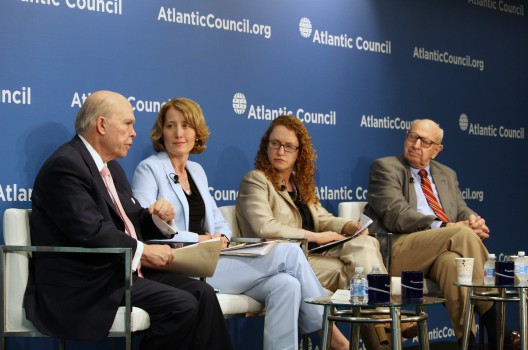On Wednesday, May 30, the Scowcroft Center for Strategy and Security hosted Swedish State Secretary for Foreign Affairs Annika Söder and a variety of other distinguished speakers to discuss the implications of an emerging multipolar-values world. Providing introductory remarks, Atlantic Council Executive Vice President Damon Wilson asserted the continued importance of the transatlantic relationship in protecting Western values, for “our interests advance with our values.” He then introduced Secretary Söder for the keynote speech. After defining values as the codes of conduct, rights, and freedoms that shape behavior, Secretary Söder addressed the forces and trends that threaten Western values, both in Europe and in the broader transatlantic and global context. Authoritarianism, corruption, and violent nonstate actors challenge democracy, while the human rights regime is pressured by the War on Terror. Additionally, the values of feminism and free trade are under siege by isolationism, protectionism, and nationalism. These forces do not only threaten Sweden, but also Europe, the US, and the entire liberal world order as established by the West; Secretary Söder stressed that “The questioning of rule of law challenges the very foundation of many states.” Without shared values, the world is destabilized.
Secretary Söder also suggested a potential path forward to solve this problem. She recommended that, in order to protect Western values, Sweden and other European states must look to allies. The US Constitution remains a strong articulation of such values, and thus the US would be a valuable ally in this multipolar world if it is willing. Europe must also seek new allies, such as the democracies in Latin America, in addition to countries like Botswana, Namibia, and Indonesia.
After Secretary Söder’s remarks, Mr. Wilson introduced the first panel for this event, which discussed the rise of a multipolar-values world, one in which Western principles are not as powerful. This panel featured Ambassador and Elliott School of International Affairs Dean Reuben E. Brigety II, Ambassador and Atlantic Council Distinguished Fellow Daniel Fried, CSIS Senior Adviser Suzanne Spaulding, Brookings Vice President and Director Dr. Bruce Jones, and Harvard Lecturer and University of Sydney Professor Dr. Pippa Norris. Moderating the discussion, Ambassador Brigety first questioned the premise of whether or not a multipolar-values world exists. Dr. Jones denied the premise, asserting that there is an asymmetric bipolar world between the US and China, each with its own set of values. Ambassador Fried offered a different perspective, arguing that values are universal but not uniform; various cultures express values in different ways. Despite different perspectives, the speakers acknowledged a diversity of expressed values and principles in the world, reflecting the challenge posed by multipolar values. Not only is there a broad conflict of values between the West and China, but there are also a variety of different values within broader blocs; the West is currently challenged by an internal conflict between liberal and nationalist values, while also externally confronting Chinese values. This is a grave political problem.
The panelists also discussed potential responses. Ambassador Fried suggested that China has profited from the current liberal world order established by the West; thus, it may be enticed into cooperating under the Western value structure. Ms. Spaulding argued that the world, while multipolar, is trending towards Western values like transparency in the long-run. Thus, “training to fight in the light” is essential for organizations and governments in the future. Dr. Jones suggested that this may be true, but the transition to such values may be long and difficult.
The second panel convened to address the implications of this shift in values for the private sector and civil society. This panel consisted of Scowcroft Center Nonresident Senior Fellow Olin Wethington, IREX President and CEO Dr. Kristin Lord, PEN America Executive Director Suzanne Nossel, and Ambassador and Atlantic Council Board Director Thomas Pickering. As moderator, Mr. Wethington began the discussion by addressing American values under siege, such as rules-based order, transparency, cross-border movement of goods, and globalization. Ambassador Pickering asserted his doubt that “there was ever a unilateral moment”; there has always been a conflict of values, and the West continues to face one today. Dr. Lord furthered the conversation by examining three trends which will profoundly affect the role of Western values in the future: 1) the global youth boom, 2) the undermined American and Western example, and 3) challenges in the information sphere. Ms. Nossel suggested potential solutions in civil society, including the fortification of institutions and the facilitation of reforms which renew democracy. She emphasized the importance of natural sentiments of curiosity and empathy which bridge gaps among people, and she argued for the engagement and empowerment of youth.
Image: From left to right: Panelists Mr. Olin Wethington, Dr. Kristin Lord, Ms. Suzanne Nossel, and Ambassador Thomas Pickering discuss the implications of divergent values in a multipolar world.
